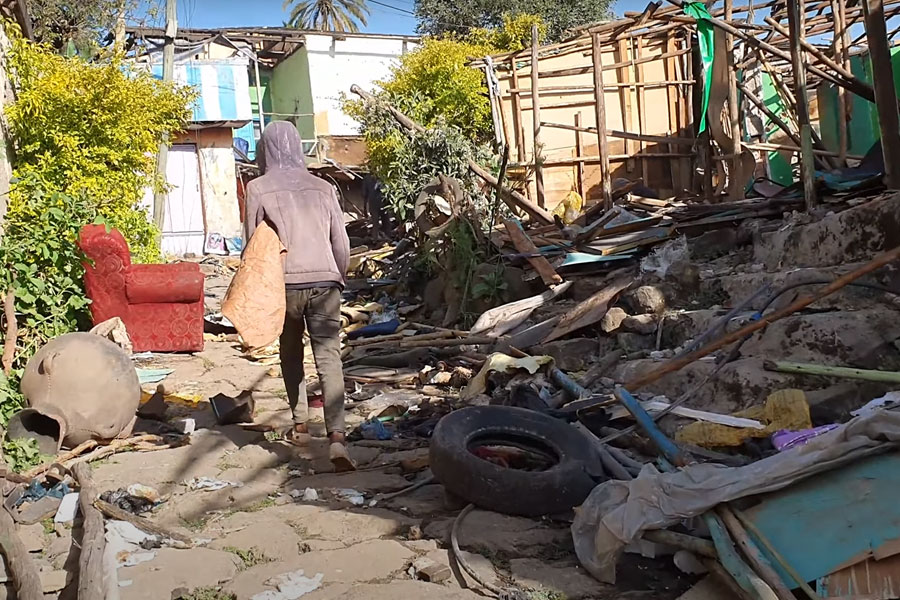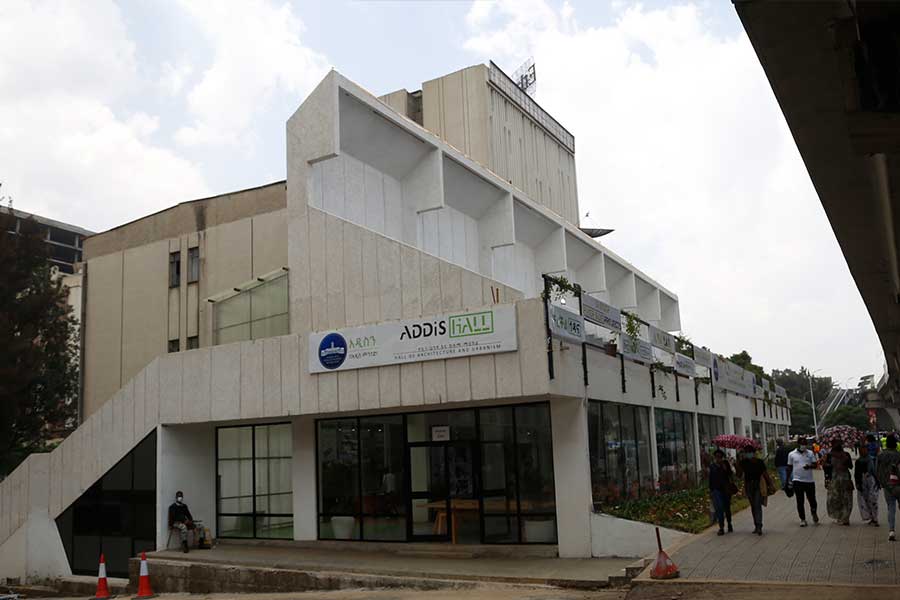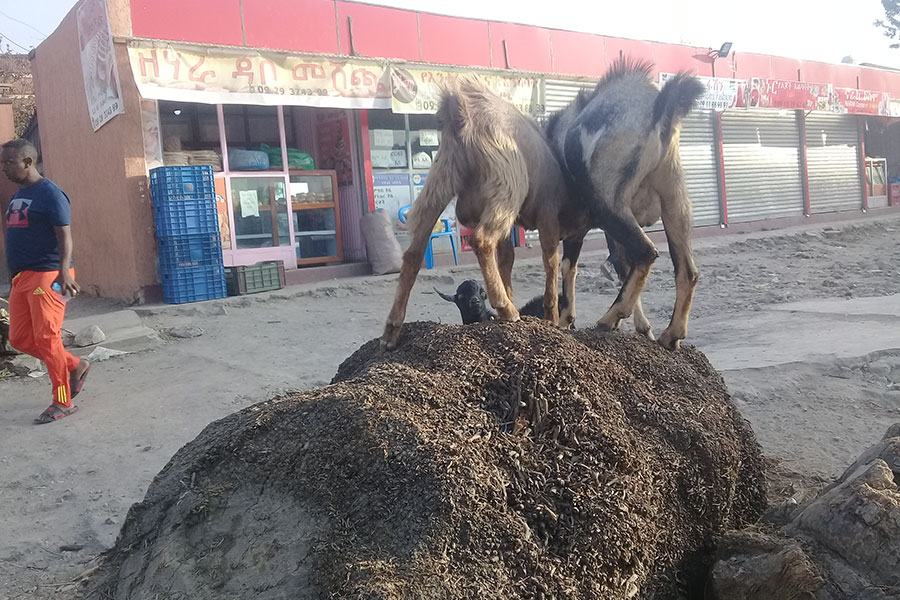
Radar | Jul 20,2019
Oct 3 , 2020
By HAGOS GEBREAMLAK ( FORTUNE STAFF WRITER )
Close to three dozen leather manufacturers will start supplying bags and shoes to students of the public schools in the capital beginning this year. Dubbed the School Shoe and Bag Uniform Project, the programme aims at creating a market for leather factories and support for low-income families.
The Addis Abeba Education Bureau and the Leather Industry Development Institute is set to pilot the project this year. Under the scheme, students will get a uniform, bag and shoes. Specifically, each student will get a bag and two pairs of shoes for each academic year.
The school shoes and bag project includes 22 leather factories and 15 micro, small and medium-scale leather manufacturers. These leather manufacturers will produce shoes and bags for students from grades one through eight.
The 37 manufacturers will supply 600,000 pairs of shoes and 300,000 bags a year to elementary students in Addis Abeba. A pair of shoes will be supplied at between 250 Br to 270 Br, depending on the size of the shoe and the price of the bags. The Institute will work on the design and inspection of the quality of the shoes and the bags.
The Institute plans to cooperate with federal and regional governments and donors to raise funds for the programme, which will start in the capital this year and in five regional states next year, according to Biruk Tilahun, communications officer at the Institute.
"We're looking for donors and NGOs who can contribute to the project," said Biruk. "The project is expected to upgrade the sector by upscaling its profitability."
Previously, the City Administration launched a school feeding programme, which offers free meals and school materials such as uniforms to over 300,000 students at public junior schools in the capital. The City Administration will partner with garment makers and donors for the project.
The Addis Abeba School Feeding Agency discussed this issue with the Institute, according to Anchinesh Tesfaye, head of the Agency.
"But it hasn't yet decided to launch the project," Anchinesh said.
The aim of the project is creating jobs, promoting local production, creating a market for micro and small-scale leather producers, and supporting students who come from low-income families, according to Biruk.
"The sector has not received major expansions or new investments for the last decade due to many challenges, mainly related to a market shortage," said Biruk.
The volume of leather and leather product exports has dropped. Three years ago the country exported 6.4 million kilograms of leather and leather products, but a year later the volume dropped 12.7pc.
To curb the challenges in the industry, the Institute initiated research a year ago. The study came up with the idea of devising a school shoes and bag programme that would create great demand for leather products.
In addition to creating a market for manufacturers, the project aims at training and enabling micro, small, and medium-scale leather makers to manufacture shoes and bags, according to Biruk.
TT Shoe Factory, which manufactures 300 to 400 pairs of leather shoes a day, is one of the beneficiaries of the project.
The factory has been challenged by the lack of a sufficient local market, according to Ephrem Marew, deputy general manager at the company, which is currently dedicating a department to exclusively makes shoes for the project.
“We expect to manufacture more than 1,000 pairs of shoes for the project," he said. "We're looking to hire more people."
The project sounds good in terms of the humanistic approach of helping many students who come from low-income families, according to Tekie Alemu (PhD), associate professor of economics at Addis Abeba University. But in terms of economic viability, subsidising the sector via such projects doesn’t entail major changes, according to him.
"Beyond buying accessories for their kids," said Tekie, "the City Administration should work on enabling parents to improve their income."
The government should rather initiate a welfare system by subsidising essential services like food and health, recommends Tekie, who believes enabling rather than subsidising parents would be preferable to solving the demand-side problem.
"The government should help the sector by integrating the agricultural and leather manufacturing industries and by levying restrictions on raw leather sales, as well as promoting value addition," said Tekie.
PUBLISHED ON
Oct 03,2020 [ VOL
21 , NO
1066]

Radar | Jul 20,2019

Agenda | Mar 23,2024

Fortune News | Sep 06,2020

Radar | Sep 14,2024

Radar | Sep 03,2022

Fortune News | Jul 13,2020

Radar | Jul 03,2021

Radar | Nov 05,2022

Fortune News | Nov 09,2019

Radar | Feb 19,2022

Dec 22 , 2024 . By TIZITA SHEWAFERAW
Charged with transforming colossal state-owned enterprises into modern and competitiv...

Aug 18 , 2024 . By AKSAH ITALO
Although predictable Yonas Zerihun's job in the ride-hailing service is not immune to...

Jul 28 , 2024 . By TIZITA SHEWAFERAW
Unhabitual, perhaps too many, Samuel Gebreyohannes, 38, used to occasionally enjoy a couple of beers at breakfast. However, he recently swit...

Jul 13 , 2024 . By AKSAH ITALO
Investors who rely on tractors, trucks, and field vehicles for commuting, transporting commodities, and f...

Oct 4 , 2025
Eyob Tekalegn (PhD) had been in the Governor's chair for only weeks when, on Septembe...

Sep 27 , 2025
Four years into an experiment with “shock therapy” in education, the national moo...

Sep 20 , 2025
Getachew Reda's return to the national stage was always going to stir attention. Once...

Sep 13 , 2025
At its launch in Nairobi two years ago, the Africa Climate Summit was billed as the f...